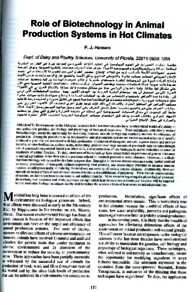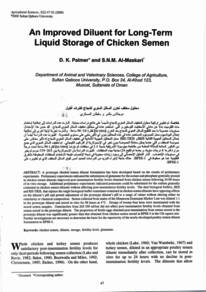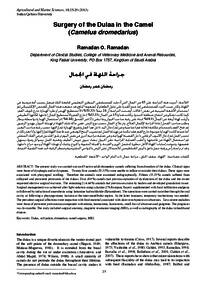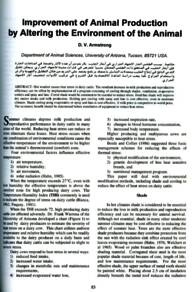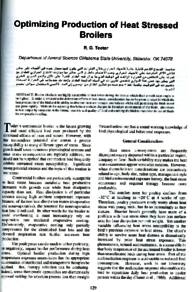Document
Role of biotechnology in animal production systems in hot climates.
Publisher
Sultan Qaboos university
Gregorian
1996
Language
English
English abstract
Developments in the biological sciences in the last three decades have revolutionized mankind's ability to manipulate the genetics, cell biology and physiology of biological organisms. These techniques, collectively termed biotechnology, create the opportunity for modifying domestic animals in ways that markedly increase the efficiency of production. Among the procedures being developed for animal production systems are marker-assisted selection of specific alleles of a gene that are associated with high production, production of transgenic animals, superovulation and embryo transfer, in vitro fertilization, embryo sexing and clonıng, production of large amounts of previously-rare proteins through use of genetically-engineered bacteria or other cells, and identification of new biologically-active molecules as potential regulators of animal function. To date, most uses of biotechnology have concentrated on problems of general relevance to animal agriculture rather than specific problems related to livestock production in hot climates. However, it is likely that biotechnology will be used for this latter purpose also. Strategies to increase disease resistance using marker-assisted selection, production of transgenic animals expressing viral proteins, and recombinant cytokines to enhance immune function should prove useful in reducing the incidence and severity of various tropical diseases. Additionally, there are methods to reduce effects of heat stress on oestrus detection and establishment of pregnancy These include remote sensing of oestrus, ovulation synchronization systems and embryo transfer. More research regarding the physiological processes determining heat tolerance and of the pathways through which heat stress alters physiological function will be required before molecular biology techniques can he used to reduce the adverse effects of heat stress on animal production.
Member of
ISSN
2410-1079
Resource URL
Citation
Hansen, P. J. (1996). Role of biotechnology in animal production systems in hot climates. Journal of the College of Arts and Social Sciences, 1 (1), 111-119.
Arabic abstract
مكنت التطورات في العلوم البيولوجية في العقود الثلاثة الأخيرة من إحداث ثورة في القدرات البشرية المعالجة الوراثة وبيولوجية الخلية وفسيولوجية الأحياء. تعرف هذه التقنيات مجتمعة بالتقنية الحيوية. وتوفر الفرصة لتحوير الحيوانات الأليفة بأساليب تزيد من كفاءة الإنتاج. تتضمن الطرق التي يتم تطويرها للاستخدام في أنظمة الإنتاج الحيواني انتخاب جينات عابرة، والتبويض المتفوق، ونقل الأجنة والتلقيح خارج الرحم وتحديد جنس الأجنة وإنتاج كميات كبيرة من البروتينات النادرة باستخدام بكتيريا أو خلايا تعرضت لهندسة وراثية وتحديد جزئيات جديدة ذات حيوية فعالة كمنظمات محتملة لوظائف الحيوان. تركزت معظم استخدامات التقنية الحيوية حتى الآن على مشاكل لها علاقة عامة بالحيوان الزراعي بدلا من مشاكل محددة ذات علاقة بالإنتاج الحيواني في الأجواء الحارة. لكن من المحتمل أن يتم استخدام التقنية الحيوية لهذا الهدف الأخير أيضا. ستثبت المخططات التي ترمي إلى زيادة مقاومة الأمراض باستخدام الانتخاب عن طريق المعلمات المساعدة وإنتاج حيوانات ذات جينات عابرة تنتج بروتينات فيروسية سايتوكاينات متحددة لدفع الوظائف المناعية تسهم في تقليل حدوث وتخفيف درجة فاعلية مختلف الأمراض في المناطق الحارة. بالإضافة إلى ذلك فإنه توجد طرق أخرى لتخفيف أثر الإجهاد الحراري على عمليات التعرف على دورة الشبق وتثبيت الحمل تشمل التعرف على البعد وسبل موائمة التبويض ونقل الأجنة. هناك حاجة أكبر للبحوث في مجال العمليات الفسيولوجية التي تتحكم في مقاومة الحرارة والطرق التي يبدل بواسطتها الإجهاد الحراري وظائف الجسم وذلك قبل استخدام تقنيات البيولوجيا الجزيئية لتخفيف الآثار الضارة للإجهاد والحرارة في مجال الإنتاج الحيواني.
Category
Journal articles

